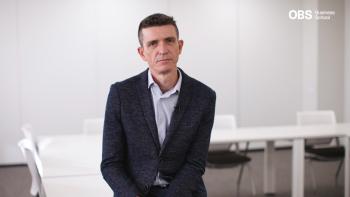
Master in Big Data and Analytics
- ONLINE
- 60 ECTS
- 7500€
- OPEN CALL
- 12 months
- SPANISH
The Master in Big Data and Analytics, with a Master's degree in lifelong learning, equips students with the knowledge necessary to manage Big Data projects from a global perspective. From detecting opportunities within an organisation to delivering solutions to business areas, students will learn to lead with confidence at every stage of the process.
All students who successfully complete the Master, may optionally take the aCAP® (Associate Certified Analytics Professional) or CAP® (Certified Analytics Professional) exams, key accreditations for the area of operations and analytics.

Master in Big Data and Analytics

Academic Partner
Additionally, obtain a double degree from our academic partner in Madrid, the University specialized in what the market demands.

QS Stars Rating System
We are the first 100% online Business School in the world to receive the QS Stars rating, obtaining the highest distinction, five QS Stars, in the Online Learning.

AMBA's BGA Membership
OBS is a member of AMBA's BGA (Business Graduates Association), an institution that recognises the academic quality of high potential Business Schools.
Syllabus for the Master's Degree in Big Data and Analytics
Our programme is structured in 3 blocks and culminates with the Master's Final Project. In addition, during the programme there will be 4 voluntary bootcamps and different additional activities.
Block 1. Strategy leadership and data lake
Block 2. Processing, advanced analytics and AI
Block 3. Governance, visualisation and business
Master's Final Project
Bootcamps and additional activities
1. Strategy leadership and data lakes
This module offers comprehensive training focused on empowering students in the strategic use of data in organizations. It begins by addressing Return on Investment (ROI), where students learn to calculate the financial impact of data projects, key to justifying investments in technology and specialized equipment. The importance of data quality is highlighted to avoid errors in decision-making, underlining the need for consistent, accurate and complete data. Managing this quality through audits, validations and cleaning techniques AND ensuring reliable data for subsequent analysis. In addition, we will cover in depth the ethics and legality in the use of data, covering regulations such as the GDPR and the implementation of principles such as transparency, informed consent and the right to be forgotten, always ensuring ethical and legally sound data governance.
Professor: Marc Subirà Docampo, Data Platform Manager at Kingfisher / Brico Dêpot.
VIEW LINKEDIN
In this module, we will explore the vast ecosystem of Big Data solutions, adapted to the different types of data and processing capabilities that each project requires. As data volumes grow, scalability and flexibility become critical aspects. Therefore, we will analyze how the most advanced solutions are designed to expand and adjust to needs, being mostly based on **Cloud environments**, although in-house options and hybrid architectures are also included. Some companies prefer to keep their most sensitive data on-premises, while others opt for completely Cloud environments or a mix between both, always seeking the balance between security and performance.
Throughout the module, we will not only delve into the differences between these architectures, but we will also explore the main Big Data solution providers, helping you understand which is the best option based on the needs of your project. In addition, we will cover strategies for designing **elastic environments** that optimize both efficiency and cost, ensuring that your architecture is able to quickly adapt to changes in demand, without compromising quality or results.
Professor: Francesc Taxonera Isart, Senior Architect. Client Technical Leader at IBM.
VIEW LINKEDIN
In the Data Ingestion (ETLs, ELTs, etc.) module, you will discover how to make the most of both external and internal data sources, from social networks and open data to business databases such as CRMs, ERPs, and transactional systems. You will learn how to manage the flow of this data, transforming it before or after loading, and then treating it through advanced aggregation processes that will allow you to generate key KPIs for decision-making.
An essential aspect will be to define and apply quality rules that ensure that the data is accurate and does not degrade the quality of your Data Lake. This module will guide you step by step in the design of data loading processes that guarantee integrity, cleanliness, historification, and efficient recursion, allowing your data to always be ready for deep and reliable analysis.
It is the basis for building solid, scalable, and high-quality data environments, ensuring that each data load supports the success of your Big Data projects.
Professor: Jordi Cahue Mestre, Innovation Lead at Kyndryl.
VIEW LINKEDIN
In the Advanced Databases module, you will delve into the world of database types beyond the traditional relational ones, designed to manage the new and different flows of information that drive business today: From managing videos, critical routes and documents, to exploiting social media data, you will learn how to manage these complex data sources that have become key to decision-making in modern companies.
We will explore how the technology market has developed innovative solutions to store and maximize the value of this data, allowing you to understand its advantages and challenges. Through practical exercises, you will have the opportunity to experiment with these technologies and discover the potential they offer to optimize the management and analysis of large volumes of information, opening up new opportunities for the success of your company.
Professor: Jordi Cahue Mestre, Innovation Lead en Kyndryl.
VIEW LINKEDIN
2. Processing, advanced analytics and AI
In the Data Mining - Basic Statistics and Data Preprocessing module, you will delve into the exciting world of extracting information from large datasets stored in your Data Lake, transforming raw data into valuable and actionable insights for your business. You will learn how to make this data not only accessible, but also easy to interpret, an essential step for strategic decision making.
Professor: Ernesto Lores Garrido, Operations Director at Achilles Solutions.
In the Advanced Analytics: R module, we will take the next step towards extracting real value from data, taking it beyond simple descriptive analysis to reach an advanced level of knowledge. Once we have ensured the quality and accuracy of the data, it is time to interpret, analyse and extract deep insights that drive strategic decisions.
Professor: Ernesto Lores Garrido, Operations Director at Achilles Solutions.
En módulos previos, los estudiantes han aprendido a interpretar datos y extraer conocimiento a través del Análisis Descriptivo. Ahora, en este módulo de Machine Learning & Inteligencia Artificial, nos adentraremos en técnicas más avanzadas con el objetivo de anticipar eventos, generar datos y crear nuevo conocimiento mediante Análisis Predictivo.
Profesor: Fernando López Bello, Machine Learning Platform Product Manager en Nestlé.
VER LINKEDIN
3. Governance, visualisation and business
In the Data Governance module, you will discover how to establish a robust and efficient framework to ensure that data is a trusted and strategic asset within the organisation. Successful data management goes beyond simply collecting data; it is crucial to define clear rules of use: who can access the information, how each piece of data is interpreted and how to maintain its lineage and traceability over time.
Professor: Francesc Taxonera Isart, Senior Architect. Client Technical Leader at IBM.
VIEW LINKEDIN
In the Visualisation Techniques module, you will discover how important a good graphical representation is when we have large volumes of data. You will learn how to choose and apply the most effective visualisation techniques according to the type of information and the objectives of the analysis. From heat maps and clusters, to dimensional plots and critical paths, you will discover how these tools not only make complex data easier to understand, but also reveal patterns and trends that would otherwise go unnoticed.
Profesor: Elena Cordero Fuertes, Senior Consultant BI en ABAST.
VIEW LINKEDIN
In the Visualisation and Self-Service Tools module, we will explore the ecosystem of visualisation tools, analysing how to choose the best solution adapted to the specific needs of each organisation. Since technology simplification is key to ensuring an efficient environment, you will learn how to select a tool that allows you to unify data visualisation across the company, ensuring the security, accessibility and availability of the same KPIs at all levels of the organisation.
Professor: Albert Fernández Blade, Product Manager & Business Consultant at SCRM – Lidl International Hub.
VIEW LINKEDIN
Master's Final Project and Additional Activities
This program is designed to complement the content of the thematic blocks with the necessary training to achieve their assimilation. Said activities are conceived from a triple perspective: technical assistance, personal support and individual and group challenges that are necessary to achieve the objectives set.
Pre-Masters Bootcamps
The student will have the opportunity to take 3 Pre-Master Bootcamps that will open progressively and can be taken at any time. Once these activities are successfully completed, students will receive a certificate of completion.
- Bootcamp 1. Personal Branding
- Bootcamp 2. Data Storytelling
- Bootcamp 3. Creative Thinking and Innovation
In addition, students will also have the opportunity to take these pre-master courses; however, these are available in English only:
- Building Your Professional Brand for Employability and Career Success
- Finance Fundamentals
Introductory Workshop | Campus Training
Before the start of the academic year, students will have the opportunity to attend an introductory workshop to the Campus, where they will be provided with the necessary tools and knowledge for the correct use of the platform during the academic year.
Professional Development Program (PDP)
Two weeks before the start of the academic year, students will be able to participate in a professional development program where they will work hand in hand with a teacher to develop different skills such as time management, productivity, stress management and emotional intelligence. Upon completion of the workshop, and provided that the relevant activities have been carried out, a certificate of completion can be obtained.
The Master's Thesis must adopt two approaches, Business and/or Technological, and within these approaches it can take multiple forms. Some examples are:
Approach 1. Business
- Example 1. Development of the Business Plan including equipment, infrastructure and deliverables to business in a theoretical business case with different types of data.
- Example 2. Business consulting project of a real business case.
Approach 2.Technological
- Example1. Development of business dashboards with a market tool with different types of data and definition of indicators.
The Master's in Big Data and Analytics is complemented by lectures and seminars given in each of the blocks. These additional activities are carried out by renowned professionals in business management who, through videoconferences, present their experiences and case studies.
Tech Bootcamp
The Big Data and Analytics programme begins with an initial Bootcamp designed to ensure that all students, regardless of their level of experience, acquire a solid technical foundation. This introductory course ensures that both the more tech-savvy and less experienced profiles have the knowledge they need to effectively progress through the master's degree and tackle Big Data projects with confidence. Throughout the Bootcamp, students will have access to resources and materials that will allow them to deepen their understanding of key concepts, as well as carry out practical activities that will serve as preparation for both the continuous assessment and the final assessment of the course.
Professor: Marc Subirà Docampo, Data Platform Manager at Kingfisher / Brico Dêpot.
VIEW LINKEDIN
Bootcamp: Graph-based databases with Neo4j and Advanced Reporting with QlikSense
In the framework of this bootcamp, students will dive into the fascinating world of graph-based databases, focusing on the practical application of Neo4j. Through hands-on activities, participants will acquire fundamental skills to efficiently model data using the graph approach, understanding the relationships and connections inherent in complex datasets. Neo4j, known for its powerful ability to represent and analyse relationships, will allow students to explore practical applications in a variety of contexts, from social networks to logistics and recommender systems.
In addition, participants will learn how to leverage their analytics through the advanced use of QlikSense for reporting. This integral component of the workshop will provide students with the tools necessary to visualise and communicate insights derived from data stored in Neo4j. From creating interactive dashboards to generating detailed reports, participants will develop key skills in effective data presentation, thereby supporting informed and strategic decision making. Ultimately, this workshop offers an immersive experience that fuses theory and practice, equipping learners with essential skills in advanced database and reporting.
Professor: Besim Bilalli, Professor.
VIEW LINKEDIN
Professor: Albert Fernández Blade, Product Manager & Business Consultant at SCRM – Lidl International Hub.
VIEW LINKEDIN
Bootcamp: Build a Cloud Lakehouse (AWS)
This second bootcamp aims to build a Lakehouse in one of the most important cloud providers today: AWS. The construction of the Lakehouse involves the use and integration of different components or data services that fit into the reference architecture used throughout the master's degree. A Lakehouse is a proposed architecture that combines the flexibility of Data Lakes with the solid management of structured data of Data Warehouses. If you place this architecture in the Cloud then you also enjoy all its advantages of scalability, flexibility, management and pay-per-use.
Professor: Jordi Cahue Mestre, Innovation Lead at Kyndryl.
VIEW LINKEDIN
Professor: Francesc Taxonera Isart, Senior Architect. Client Technical Leader at IBM.
VIEW LINKEDIN
Bootcamp: Preparation for CAP/aCAP certification
During two weeks, students will develop a bootcamp where they will be provided with all the information regarding the CAP (for students with more than 3 years of professional experience in Big Data and Analytics) or aCAP (for students with less than 3 years of professional experience in Big Data and Analytics) certifications. Students will be provided with the additional material necessary to prepare for these certifications. The workshop will be divided into three blocks: 1. Introduction to the key concepts; 2.
*The cost of the certification is NOT included in the price of the programme. However, students receive a discount on the exam fees.
Professor: Raquel Jorge Hernando, Analytical Model Controller at Climbea.
VIEW LINKEDIN
Case studiesThe practical component of the programme is essential and complements the theoretical training. During the course there will be debates on current topics of interest in each of the subjects, simulations for decision-making applied to real situations or case studies where the problems posed and the solutions proposed will be analysed from an academic point of view, as well as the criteria taken into account to carry them out.
Webinars
Most of the training is done asynchronously, i.e. the exchange of knowledge is done through a platform that allows the sharing of written texts without the need for people to be connected at the same time.
Additionally, in each of the modules, synchronous sessions or ‘webinars’ are organised, i.e. sessions in which all participants are connected at the same time, through an application, allowing the exchange of knowledge in ‘real time’.
Company visits
During the course of the programme, students will have the opportunity to attend synchronous videoconferences with professional experts in the programme area. They will share their experience and provide best practices in the sector.
Students taking the Lifelong Learning Master's in Big Data and Analytics will have the opportunity to prepare for the following certification:*
- CAP Certification (for students with more than 3 years of professional experience in analytics) and aCAP Certification (for students with less than 3 years of professional experience in analytics).
*The cost of the certification is NOT included in the price of the programme; however, OBS students receive a discount on the exam fees.
In addition, students will also have the opportunity to prepare for the following certifications**:
- ICN Business IT Certification
- Scrum Certification (Product Owner & Scrum Master)
**The cost of the certifications and the preparatory course is not included in the price of the programme.
Methodology

OBS has an online methodology where the student is always at the core of the process. Said methodology is backed by active and internationally renowned professors who share their knowledge to enhance the professional development of students through a flexible, collaborative method with personalized monitoring. The goal is to create a unique educational experience that allows the assimilation of knowledge in a practical way.
Given that the fundamental pillar of the Student ON methodology is the student, each of them has their own Program Manager throughout the course, an academic figure that accompanies the student in a personalized way.
Diploma
After successfully finishing the programme, and having completed the relevant procedures, you will receive the OBS Business School diploma. In addition, and provided that you meet the established academic and administrative requirements, you will obtain a Lifelong learning Master's degree from the Universidad Internacional de la Empresa (UNIE). In order to obtain it, you must have a University Degree (Engineering, Bachelor's Degree or Diploma).
At OBS Business School we are committed to having our own degree, which allows us to quickly update and adapt the programmes in each edition to be at the forefront of the educational level demanded by companies today. Our programmes are designed for professionals who want to strenghten their management skills and learn through an international experience.

Admission Process
The fundamental aim of our admissions process is to ensure the suitability of candidates. All participants should get the most out of this learning experience, through a context in which it is possible to develop long-term relationships with classmates, faculty and alumni.
After completing the application form for one of our programmes, you will receive an e-mail with information about the School and a member of the Admissions Department will contact you to start the admission process. Once you have successfully passed the personal interview, you must submit all the required documentation to continue the admission process and certify that you meet the requirements of the student profile. After the Admissions Committee, if it is positive, you will be able to register and enrol in the programme you have applied for.

Professional Opportunities of the Master in Big Data and Analytics
This Master’s degree will help you boost your professional career as:
- Head of Big Data and advanced business analytics projects.
- External consultant
- Head of Big Data infrastructures in the ICT area.
- Chief Data Officer (CDO)
- Data analyst



